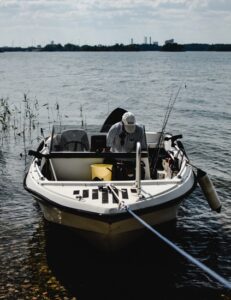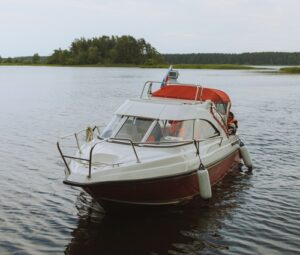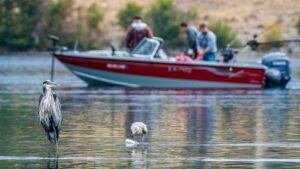Tips For Buying A Used Fishing Boat.

Putting together the perfect combination of equipment and boat is nearly as much fun as the fishing trips themselves. However, there’s a few points to keep in mind when buying a used fishing boat. These are very important tips for buying a used fishing boat.
Below in the article has some specific questions, or items to look for when buying a second hand boat. You could even use it for a checklist when looking over the boat and asking the seller some questions about the boat.
Is it the right size fishing boat for you?

“On the water the boat is never big enough, but storing the boat and towing it, the boat is always too big.”
You’ll probably find yourself considering a lot of different boats as you go over the available options. It’s often quite easy to find ourselves tempted by a good deal. But there’s one point in particular that you need to remain firm on. You don’t want to pay for too large a boat for your fishing needs. Likewise, you don’t want to compromise on a boat that’s too small for you needs just because it’ll save you some money.
It’s best to carefully consider how big of a boat you’ll need before you actually start looking at the available options. This way you won’t find yourself wavering as you go over the choices.
You should begin by thinking about how many people will be on your boat. For example, your partner might not be into fishing at the moment. But are you sure that won’t change? The same goes with friends and family. Which people would you ideally want to bring with you on a fishing trip? You should ensure that a boat is big enough to fit what you’d consider an ideal trip.
Children grow up and fitting two kids in the boat now, is different to fitting a couple of growing teenagers in the boat with you later on.
Likewise you’ll want to ensure that you can fit all the gear you’d like to bring along. This goes for what any fishing friend would want to bring as well.
And of course you should plan on having room for all the fish you’ll be catching. (Wishful thinking I know, but should be considered.)
Not only room inside the boat should be well-thought-out, but also will the boat be big enough and safe enough for your fishing waters? Does your water ways get rough and you need a bigger boat for safety?
Do you fish for trout or bass in sheltered small lakes, or do you chase big game fish in the rough open ocean? Is the boat the correct size and safe size for your targeted fishing spots and waters? These point needs some thought.

Is the boat motor in good condition?
If you were buying a used car you’d make sure you tested out the motor. The same principle holds true for a boat.
You might think that you’d need to have some serious expertise to judge the quality of a boat’s outboard motor or engine. However, there are some hints which will suggest how well a motor’s working.
One of the biggest clues to look for is whether or not the engine looks clean. Even the best motor is going to require some attention every now and then. Ask if you can take the cowl off and look at the outboard motor. And if a motor’s covered in dirt or grime than it’s quite possible the owner hasn’t been taking care of it. Or it hasn’t been getting a regular service.
You can also try manually turning the propellers. While you’re doing so you can look for any damage to the blades. Gashes or dents are the most obvious problem to look for. But you should also see if the propeller isn’t moving smoothly and firmly.
You should also ask to run the engine for a while to verify it’s working properly. This should ideally be done both on land and the water. Don’t just gauge whether the engine is running properly at the moment either. Look for issues like oil leakage which might not be obvious at first glance. A motor can run fine for a while with a leak. But a leak will come back to haunt you if you overlook it.
Just another point on the motor, is it big enough for the boat?
A too small of a motor will also puts a lot of stress on it, trying to power a big boat. This will wear out the motor quicker and it will break down more.
A struggling small outboard motor is not just slow, but it is also a safety issue for when you need to get back to shore quickly if a storm comes in.
Can you test the boat on the water?
Getting a boat onto the water lets you test out more than just the motor. You can also get a feel for how the boat handles. This part isn’t something which can really be advertised or described by another person. When a boat is the right fit for you than you’ll just know.
Most cars have their own unique quirks on the road. Likewise, you’ll notice that every boat handles a little differently on the water as well. If possibly you should try to replicate everything you’d want to try on a fishing trip. That way you can be sure if the boat is a good fit for your own style.
What is included in the sale of the boat?
This is where we can see the danger of assumptions. People often give the boat a test run and assume they’re buying that exact experience. But a boat is typically outfitted with a wide variety of supplies.
It’s quite possible, even probable, that not all of the items on the boat will be included with a sale. You should always double check what is and isn’t included with the boat. If anything you like isn’t included with the boat than you can use this discussion to try negotiating for its inclusion.
Has the boat got a fish finder, is that included? What about the external fuel tank, oars, semi attached fishing rod holders, are they included in the price? Life jackets, maritime safety equipment like flares, or the anchor, does that come with the boat?
I have heard of cases where the fisherman is close to buying the boat, and then the seller tells them the boat trailer is not included in the sale price.

Where will you store the fishing boat?
People often forget about boat storage right up until the moment they’ve finalized the sale. Depending on the size, some first time owners often assume that they’ll simply keep their boat in the water or at a marina. This can be an option in many locations. However, in general it’s not a good idea to continually expose a boat to the elements.
Everything from bad storms to freezing temperatures can cause damage to a boat left unattended in the water.
If you do store it in a marina, what are the total costs?
Does boating insurance cover the boat while it is docked or stored?
It’s usually best to have some form of dry storage. However, you might not have room in your garage for your new boat. If that’s the case than you’ll want to rent storage for it. This will also usually mean less work transporting the boat from dry storage to the water. However, boat storage will cost money in the long term.
It’s important to keep boat storage costs in mind when looking over just how much you’re going to be spending on the boat.
Convenience, cost and taking care of the boat are questions to consider for storage.
How much are you saving or spending on a used boat?
With all of this in mind you should have a good idea of just how much you’ll be paying for the boat. You should also try to factor in any other miscellaneous expenses you’ll need before taking the boat out onto the water.
For example, you should have life jackets and safety gear for anyone going out with you. (For more information on boating safety equipment, click on Fishing Boat Safety Accessories.)
You should also calculate all of the costs involved with buying a used boat and then compare it to what you’d be paying for a new fishing boat. There’s two important reasons for doing so. The first is that you should be aware of the total cost of a complex and significant purchase like this. Getting a firm total puts the purchase into a more strictly defined context. Before doing so it’s easy to just look at the list price for the boat and ignore all of the extra costs. Fishing boat accessories can really add up.
By comparing the price of a used boat to a new one you’re also seeing just how much you’ll save. This is important because buying used should provide you with significant savings. It’s easy for extra costs to pile up to a point where the used boat becomes more expensive than the new.
For example, you might have to pay extra for maintenance fees or replace the motor. However, if you keep all of these tips in mind you can rest assured that you’ll have a great experience with your purchase. There’s a lot to keep in mind when shopping for a used boat. But the only thing you’ll need to concern yourself with afterward is having a great time on the water.
Visit Fishing Boat Maintenance for more information on looking after your boat. (And how to wash a boat.)
Any boat warranty?
If you’re buying from second hand from a fishing enthusiast than you probably won’t have a warranty. But you shouldn’t assume that you’ll never have the option.
If you’re buying from a boat dealer or broker than there is a fair chance that they’ll provide a warranty. If so you should go over the warranty carefully to make sure it lives up to your expectations. During the sale people will often justify higher costs by bringing up a warranty. But a warranty is only valuable if it’s something you might actually get use out of.
Specific questions you might ask or check, when buying a second hand fishing boat.
Is the boat suitable for the fishing conditions or spots? You wouldn’t take a small aluminum boat way out in the open sea fishing. Likewise you would take a big fiberglass boat in a small shallow lake with exposed tree stumps, snags and rocks.
What is it mainly going to be used for? Does it suit your fishing style? E.g. if you are fly fishing you might need an open deck, or spinning platform for bass. For deep sea big game fishing you might need dual motors and a big boat. For fishing swamps, a flat hull, etc.
Is it big enough? Is the family going to fish in it, or just one or two? What is it legally allowed to carry?
Is there any service history of the outboard motor?
What is the condition of the boat? Any damage? Look at the hull for cracks in aluminum hull, or splinters cracks for fiberglass hulls.
Is the propeller in good condition?
Can you test it on the water?
Is the outboard boat motor going to be enough powerful enough for the boat and water conditions?
How old is the boat?
Do the electrics work? Is the marine battery in good condition?
Does the bilge pump, night lights work?
Are the fuel lines in good condition?
What does the cost include? Do you get any accessories like, such as oars, electricals, fish finder / GPS, any lifejackets, rod holders, external fuel tanks, and canopies in the price?
What is a new boat/model cost compared to what the used boat is selling for?
If you are buying from a boat dealer / broker is there any warranty?
What is the conditions of marine carpet, decking, canopies, Bimini top?
Condition of boat trailer. Not rusty. Lights work, winch working. Looking at condition of tires. Does the trailer have a spare tire?
Hidden costs: What Boat insurance would be enough to cover it? Does the insurance cover the boat in storage, travel, on the water?
Does the boat have to be registered for its size or in a certain state?
Where would the fishing boat be stored?
Is your truck/car big enough to tow the boat?
Conclusion – Tips for buying a used boat.
Humanity has always felt an undeniable draw when looking out onto the open waters. We often feel a unique combination of relaxation and call to adventure when thinking about fishing trips.
On one hand the technical minute by minute details of fishing are usually quite relaxing. But on the other hand there’s always a whole unseen world to explore underneath the water’s surface. What’s more, even planning a fishing expedition can prove to be a journey unto itself. But even before we get to this stage we need a good boat that fits our needs. So hopefully these tips and advice for buying a used fishing boat will get you on the water quicker for the next adventure.
